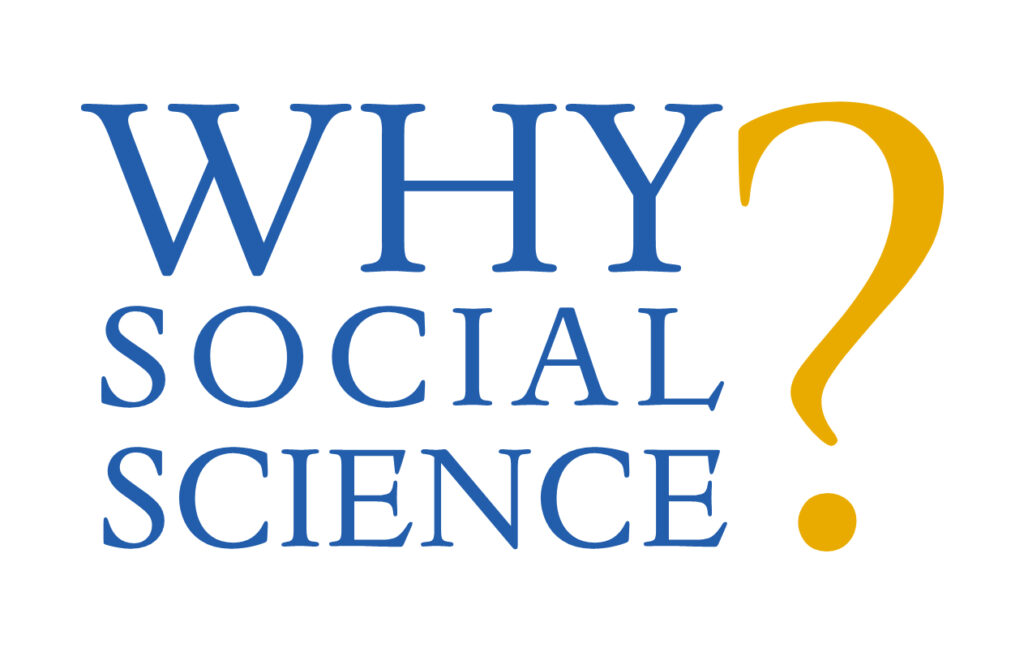Issue 24 (December 12)
Advocacy Day Spotlight: Early Bird Registration is OPEN!
Early bird registration for COSSA’s tenth annual Social Science Advocacy Day is officially OPEN! The event will be taking place April 8-9, 2024 in Washington, DC. Register here.
Don’t miss this opportunity to have an impact on funding and policy important to the social science community.
“I will come back every year if my university allows,” said a past Social Science Advocacy Day participant. “It’s one of the highlights of my academic career. Makes me think differently about my work and want to get into politics.”
Social Science Advocacy Day is open to anyone affiliated with a COSSA member organization or university. Not a member? Learn how here.
If your organization is interested in becoming a sponsor of Social Science Advocacy Day, learn more here.
Visit the COSSA website for the latest information on Social Science Advocacy Day.
Dr. Rayvon Fouché from Northwestern University Answers “Why Social Science?”
The recent Why Social Science? post comes from Dr. Rayvon Fouché from Northwestern University who writes about how social science can provide valuable history, context, and interpretive perspectives to help inform our societies moving forward.
Read on for more.
As Congress Prepares for Holiday Recess, FY24 Budget Remains Uncertain
As the year comes to an end, Congress remains no closer to finding a resolution to the fiscal year (FY) 2024 appropriations process. As previously reported by COSSA, Congress passed a continuing resolution (CR) to extend the appropriations deadline to after the new year. Early last week, Senate Majority Leader Charles E. Schumer (D-NY) and Appropriations Chair Patty Murray (D-WA) unveiled a supplemental funding bill that would provide $110.5 billion of economic and humanitarian aid to Israel and Ukraine, Taiwan and Indo-Pacific allies and funding to combat fentanyl trafficking and process migrants crossing the U.S. southern border. The bill was halted by Republicans, expressing that the bill did not adequately address the border crisis.
The House has successfully passed seven funding bills, including Defense, Energy-Water, Homeland Security, Interior-Environment, Legislative Branch, Military Construction-Veterans Affairs, State-Foreign Operations. The House began their initial vote on November 14 for the Labor, Health and Human Services, Education (LHHS) funding bill but delayed the end of the vote to an unspecified date (see previous COSSA coverage). The House also intended to consider the Commerce, Justice, and Science (CJS) funding bill, however, that vote was also delayed. COSSA recently published a full analysis providing details of the House’s FY 2024 LHHS and CJS appropriations bills as introduced. The House has yet to express any intention to resume these votes in the upcoming weeks.
It’s uncertain whether Congress will cross the appropriations finish line or need to pass a year-long CR to avoid a government shutdown in early 2024. Senator Murray (D-WA) recently released a fact sheet on the impacts of a year-long CR. Further, the FY 2025 appropriations process is intended to begin in early February with the Presidential Budget Request. If Congress continues to delay finalizing the FY 2024 budget, the FY 2025 budget process will likely be delayed as well.
Stay tuned to COSSA’s continued coverage of the appropriations process.
House Passes Deterrent Act Aimed to Tighten Foreign Financial Contribution Regulations
The House of Representatives recently passed the Defending Education Transparency and Ending Rogue Regimes Engaging in Nefarious Transactions (DETERRENT) Act. This legislation aims to tighten regulations on foreign financial contributions to American universities and academics. The act reflects growing concerns about foreign influence in American higher education and research sectors.
One of the act’s central features is the reduction of the reporting threshold for foreign funding. Previously set at $250,000, the threshold would now be $50,000 for most countries, with a zero threshold for nations deemed as “countries of concern,” including China and Iran. This change aims to increase transparency in foreign funding, particularly from nations that might have strategic interests contrary to those of the United States.
The legislation introduces stringent disclosure requirements for individual researchers at universities receiving more than $50 million annually in federal R&D funds. This is an attempt to close loopholes that previously allowed foreign entities to obscure their influence.
The bill’s proponents, like Representative Virginia Foxx (R-NC), have cited cases like that of Charles Lieber, who was sentenced earlier this year for lying to federal authorities about his ties to China. Despite its objectives, critics, including some Democrats, argue that the act could have a chilling effect on global scientific cooperation. They fear it may lead to discriminatory xenophobic practices against researchers with ties to the targeted nations.
The American Council on Education has expressed concerns over the act, particularly over provisions requiring waivers from the Department of Education for contracts with countries or entities of concern. “This provision is particularly concerning because the definition of a ‘contract’ in the bill is incredibly broad and therefore will likely capture not only all research agreements, but also student exchange programs and other joint cultural and education programs with Chinese institutions,” the council wrote in a letter to Congress.
The DETERRENT Act will now move to the Senate. The Senate has not introduced companion legislation but various senators have expressed interest in expanding oversight of foreign contracts and gifts to universities.
Stay tuned to COSSA’s continued Congressional coverage.
OBSSR Hosts Behavioral and Social Sciences Research Festival
On December 5, the National Institutes of Health’s (NIH) Office of Behavioral and Social Sciences Research (OBSSR) held their annual Behavioral and Social Sciences Research Festival. The festival highlighted various research areas supported by the office and the full agenda can be found here.
In her opening remarks, newly appointed OBBSR Director Jane Simoni identified the office’s scientific interests for 2024, including theory-informed research on behavior change and mechanisms of impact, social connection and health, multi-level research, health communication science, and the integration of BSSR into biomedical research (see previous COSSA coverage).
The recording of the festival is expected to be published here within the next month.
NSF Announces EducateAI for Nationwide AI Education
The National Science Foundation (NSF) launched EducateAI, an initiative aimed at enhancing artificial intelligence (AI) education across the United States. This program targets a broad audience, from K-12 to graduate students and adults seeking formal AI training. The initiative’s core objective is to empower educators and students with essential AI knowledge and skills, fostering an inclusive environment for learning about AI technology.
The initiative’s first step involves publishing the EducateAI Dear Colleague Letter, calling for proposals that advance inclusive computing education and integrate innovative AI-focused curricula. Funded by NSF’s CISE and STEM Education directorates, the call for proposals seeks to develop comprehensive educational materials in line with the latest AI advancements.
Learn more about the EducateAI initiative here.
OSTP Investigates the Costs of Open Access Publishing
On November 22, the White House Office of Science and Technology Policy (OSTP) published a report exploring the impact for covering the cost of openly publishing federally-funded research. The report outlines multiple challenges endured by federal grantees and intramural researchers, but estimates that in 2021 the cost was roughly $378 million.
Congress requested the report through its appropriations legislation for fiscal year (FY) 2023, citing concerns that some open access publishing financing mechanisms, particularly total article processing fees (APCs) and transformative agreements, may “present growing barriers to knowledge generation and sharing.” Congress asked OSTP to estimate how much of the costs of both APCs and transformative agreements were reinforced by federal grantees.
OSTP was clear that it is unable to offer an accurate estimate of the costs of transformative agreements, citing intricacies in how they are financed. The report builds on an economic analysis OSTP released in August 2022 alongside a directive that requires federally funded research publications to be free to read immediately upon publication, starting in 2026 (see previous COSSA coverage).
CALL FOR EXPERTS: Communications Advisory Group for the National Academy of Medicine
The National Academy of Medicine (NAM) announced that they will be appointing a Communications Advisory Group to inform the direction of its communications and engagement activities. The group will be comprised of 15 volunteers to serve 2-year terms, beginning in January 2024. NAM is looking for a mix of experts with a particular interest in the following:
- AI integration and emerging trends in communications
- Community engagement
- Content strategy and creation
- Crisis communications
- Data and analytics
- Diversity, equity, and inclusion
- Fundraising
- Informal STEM education
- Issue advocacy
- Media outreach
- Political diversity
- Science communication
- Social media
Learn more about the group and submit nominations for members by December 15 here.
APA Releases Report on Countering Misinformation
The American Psychological Association (APA) released a comprehensive report addressing the challenges of misinformation, particularly in the realm of health, well-being, and civic life. Providing eight recommendations for a collaborative effort between scientists, policymakers, media professionals, and the public to combat the spread and impact of misinformation:
- Avoid repeating misinformation without including a correction.
- Collaborate with social media companies to understand and reduce the spread of harmful misinformation.
- Use misinformation correction strategies with tools already proven to promote healthy behaviors.
- Leverage trusted sources to counter misinformation and provide accurate health information.
- Debunk misinformation often and repeatedly using evidence-based methods.
- Prebunk misinformation to inoculate susceptible audiences by building skills and resilience from an early age.
- Demand data access and transparency from social media companies for scientific research on misinformation.
- Fund basic and translational research into the psychology of health misinformation, including effective ways to counter it.
APA is a COSSA governing member. To read the full report, visit here.
Sage Publishing Launches Sage Policy Profiles Tool
Sage Publishing has officially launched their new tool, in partnership with Overton, titled “Sage Policy Profiles“. The tool is free-to-use and enables individual researchers and academics to easily discover how their work is impacting policy.
Additional functionalities of the tool include:
- Identifying second-order citations where policies citing users work have continued to influence subsequent discussions and decisions.
- Personalized alerts that inform users of a new citation or mention in policy documents.
- Compatible with PowerPoint and the ability to create a shareable link for personalized dashboards.
Sage is a COSSA affiliate member. Learn more about the tool here.
Editor’s Note: Update Returning on January 9
This is our final issue of the COSSA Washington Update for 2023. Late-breaking news and analysis will be shared with members subscribed to our members-only emails. We will resume our ongoing coverage of policy developments affecting the social and behavioral sciences on January 9.
The COSSA team wishes all our readers a happy and healthy holiday season.






